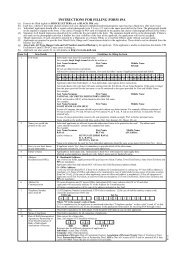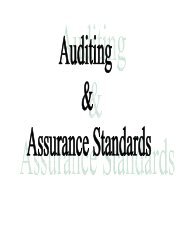- Page 2 and 3:
TABLE OF CONTENTS DISCLOSURE OF ACC
- Page 4 and 5:
Explanation Fundamental Accounting
- Page 6 and 7:
21. Examples of matters in respect
- Page 8 and 9:
Definitions 3. The following terms
- Page 10 and 11:
(b) storage costs, unless those cos
- Page 12 and 13:
27. Information about the carrying
- Page 14 and 15:
performance by different enterprise
- Page 16 and 17: 15. The separate disclosure of cash
- Page 18 and 19: 22. Cash flows arising from the fol
- Page 20 and 21: 34. Cash flows arising from taxes o
- Page 22 and 23: The appendix is illustrative only a
- Page 24 and 25: Interest expense (400) Interest inc
- Page 26 and 27: Interest expense 400 Operating prof
- Page 28 and 29: 31,850 Less : Sundry debtors at the
- Page 30 and 31: Short-term funds (650) Deposits hel
- Page 32 and 33: not contingencies as defined in par
- Page 34 and 35: 8.6 Events occurring after the bala
- Page 36 and 37: Accounting Standard (AS) 5 Net Prof
- Page 38 and 39: financial statements in understandi
- Page 40 and 41: gratuity scheme by an employer in p
- Page 42 and 43: (ii) expected useful life of the de
- Page 44 and 45: 19. A change in the method of depre
- Page 46 and 47: Accounting Standard 7 (REVISED) Con
- Page 48 and 49: 8. A group of contracts, whether wi
- Page 50 and 51: a. costs that relate directly to th
- Page 52 and 53: estimated reliably when all the fol
- Page 54 and 55: of which recovery is probable; and
- Page 56 and 57: defects have been rectified. Progre
- Page 58 and 59: incurred for work performed upto th
- Page 60 and 61: calculated as follows: (amount in R
- Page 62 and 63: 4.3 Proportionate completion method
- Page 64 and 65: the time of raising of any claim it
- Page 68 and 69: Accounting Standard (AS) 10 Account
- Page 70 and 71: 9.3 Administration and other genera
- Page 72 and 73: 14.4 On disposal of a previously re
- Page 74 and 75: either to the asset given up or to
- Page 76 and 77: Accounting Standard (AS) 11 (Revise
- Page 78 and 79: Reporting currency is the currency
- Page 80 and 81: Classification of Foreign Operation
- Page 82 and 83: . income and expense items of the n
- Page 84 and 85: historical cost for those items in
- Page 86 and 87: Appendix Note: This Appendix is not
- Page 88 and 89: Accounting Treatment of Government
- Page 90 and 91: 8.1 Grants related to specific fixe
- Page 92 and 93: (The Accounting Standard comprises
- Page 94 and 95: Accounting Standard (AS) 13 Account
- Page 96 and 97: fair value provides a prudent metho
- Page 98 and 99: 31. Investments classified as curre
- Page 100 and 101: (v) No adjustment is intended to be
- Page 102 and 103: Treatment of Reserves on Amalgamati
- Page 104 and 105: (a) consideration for the amalgamat
- Page 106 and 107: 41. Where the scheme of amalgamatio
- Page 158 and 159:
Accounting Standard (AS) 16 Borrowi
- Page 160 and 161:
orrowings made specifically for the
- Page 162 and 163:
Accounting Standard (AS) 17 Segment
- Page 164 and 165:
statement of profit and loss. Segme
- Page 166 and 167:
segments for internal financial rep
- Page 168 and 169:
24. Business and geographical segme
- Page 170 and 171:
calculation done in applying a part
- Page 172 and 173:
Secondary Segment Information 47. P
- Page 174 and 175:
segment, both primary and secondary
- Page 176 and 177:
REVENUE External sales Intersegment
- Page 178 and 179:
101 90 Assets and additions to tang
- Page 180 and 181:
and intangible fixed assets by loca
- Page 182 and 183:
4. In the context of this Statement
- Page 184 and 185:
(c) the director is nominated by th
- Page 186 and 187:
(iii) a description of the nature o
- Page 188 and 189:
1. upon the occurrence of some remo
- Page 190 and 191:
5. The classification of leases ado
- Page 192 and 193:
Rs.2,27,805. As this amount is lowe
- Page 194 and 195:
f. a general description of the les
- Page 196 and 197:
commencement of the lease term is t
- Page 198 and 199:
48. If a sale and leaseback transac
- Page 200 and 201:
AS 20 Earnings Per Share (In this A
- Page 202 and 203:
c. options including employee stock
- Page 204 and 205:
merger is the aggregate of the weig
- Page 206 and 207:
29. For the purpose of calculating
- Page 208 and 209:
41. Potential equity shares are ant
- Page 210 and 211:
Note: These appendices are illustra
- Page 212 and 213:
EPS for the year 20X0 as originally
- Page 214 and 215:
Convertible Preference Shares Incre
- Page 216 and 217:
(a) the ownership, directly or indi
- Page 218 and 219:
the consolidated financial statemen
- Page 220 and 221:
subsidiary and does not become an a
- Page 222 and 223:
Accounting Standard (AS) 22 ACCOUNT
- Page 224 and 225:
accounting purposes, straight line
- Page 226 and 227:
(a) has a legally enforceable right
- Page 228 and 229:
6. If for any reason the recognitio
- Page 230 and 231:
Deferred tax A/c Dr. 20,000 To Prof
- Page 232 and 233:
Accounting Standard (AS) 23 Account
- Page 234 and 235:
(b) the associate operates under se
- Page 236 and 237:
Disclosure 22. In addition to the d
- Page 238 and 239:
. that represents a separate major
- Page 240 and 241:
infrequently. All infrequently occu
- Page 242 and 243:
g. the amount of pre-tax profit or
- Page 244 and 245:
35. Appendix 2 illustrates applicat
- Page 246 and 247:
The following is Note 5 to Delta Co
- Page 248 and 249:
III. Financial Statements for 20X3
- Page 250 and 251:
2 A separate Accounting Standard on
- Page 252 and 253:
6. A complete set of financial stat
- Page 254 and 255:
g. segment revenue, segment capital
- Page 256 and 257:
29. To illustrate: a. the principle
- Page 258 and 259:
Accounting Standard to assist in cl
- Page 260 and 261:
1. Basic Earnings Per Share 2.Dilut
- Page 262 and 263:
provisions for employees (b) Other
- Page 264 and 265:
(condensed or complete) for the fol
- Page 266 and 267:
1st Quarter 2nd Quarter 3rd Quarter
- Page 268 and 269:
Accounting for the Effects of Chang
- Page 270 and 271:
a. intangible assets that are cover
- Page 272 and 273:
ecoverable amount.4 Carrying amount
- Page 274 and 275:
supportable assumptions that repres
- Page 276 and 277:
Therefore, in addition to complying
- Page 278 and 279:
titles, customer lists and items si
- Page 280 and 281:
Past Expenses not to be Recognised
- Page 282 and 283:
The enterprise amortises the right
- Page 284 and 285:
assets, how it determines the recov
- Page 286 and 287:
e. copyrights, and patents and othe
- Page 288 and 289:
Appendix A This Appendix, which is
- Page 290 and 291:
aforesaid and expensed in an earlie
- Page 292 and 293:
without physical substance held for
- Page 294 and 295:
Application and Infrastructure Deve
- Page 296 and 297:
On 1-4-2003, the remaining period o
- Page 298 and 299:
Accounting Standard 27 Financial Re
- Page 300 and 301:
The arrangement identifies those de
- Page 302 and 303:
the assets; c. its share of any lia
- Page 304 and 305:
separately as part of the inventory
- Page 306 and 307:
44 In case of transactions between
- Page 308 and 309:
Accounting Standard (AS) 28 Impairm
- Page 310 and 311:
4. The following terms are used in
- Page 312 and 313:
e. evidence is available of obsoles
- Page 314 and 315:
15. It is not always necessary to d
- Page 316 and 317:
ate can be justified. This growth r
- Page 318 and 319:
38. A restructuring is a programme
- Page 320 and 321:
. the enterprise’s incremental bo
- Page 322 and 323:
generate cash inflows from continui
- Page 324 and 325:
determined excluding cash flows tha
- Page 326 and 327:
esult from synergy between the iden
- Page 328 and 329:
88. In allocating an impairment los
- Page 330 and 331:
paragraphs 106 to 107 and for goodw
- Page 332 and 333:
102. Any increase in the carrying a
- Page 334 and 335:
a. if the enterprise sells the disc
- Page 336 and 337:
ased on the enterprise’s primary
- Page 338 and 339:
EXAMPLE 3- EXAMPLE 4- EXAMPLE 5- EX
- Page 340 and 341:
determining value in use of both X
- Page 342 and 343:
Total 10,000 7,000 3,000 A24. T use
- Page 344 and 345:
of the asset for tax purposes is Rs
- Page 346 and 347:
Gross carrying amount 1,000 2,000 3
- Page 348 and 349:
in forecasting cash flows. This res
- Page 350 and 351:
Schedule 1. Calculation of the plan
- Page 352 and 353:
Schedule 5. Summary of the carrying
- Page 354 and 355:
End of 20X4 A B C Goodwill Z Carryi
- Page 356 and 357:
in Rs. lakhs) Year Future cash flow
- Page 358 and 359:
Accounting Standard (AS) 29 Provisi
- Page 360 and 361:
The objective of this Statement is
- Page 362 and 363:
settle the obligation; or ii. a rel
- Page 364 and 365:
17. Financial statements deal with
- Page 366 and 367:
may result in the recognition of in
- Page 368 and 369:
warranties). The other party may ei
- Page 370 and 371:
expenditures are recognised on the
- Page 372 and 373:
It does not form part of the Accoun
- Page 374 and 375:
paragraphs 14 and 21). Example 3: O
- Page 376 and 377:
2005, the enterprise's lawyers advi
- Page 378:
an onerous contract as a contract i




